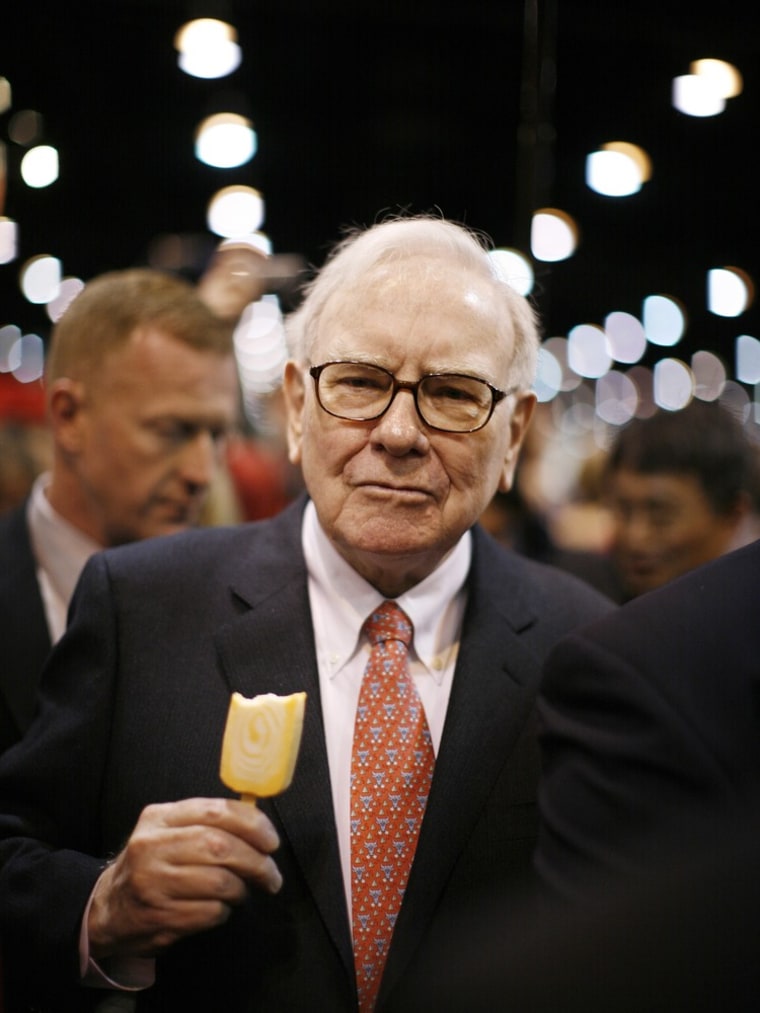The pool of internal candidates to eventually replace Warren Buffett as Berkshire Hathaway's chief executive has expanded to four, the company said in a regulatory filing Monday.
The revered 80-year-old investor has said for several years that the Omaha-based company had three internal candidates to replace him as CEO someday, but has refused to name them. The new details about Berkshire's succession plan emerged two days after the company released Buffett's annual letter to shareholders.
Berkshire plans to split Buffett's job into three parts — chief executive officer, chairman and several investment managers.
Buffett remains in good health and has no plans to retire, but he says Berkshire's board regularly discusses succession and knows who it would pick as CEO if the need arises.
Buffett's assistant Carrie Kizer said he was travelling Monday and would not be immediately available to comment.
The revelation about a fourth candidate reinforces speculation that Burlington Northern Santa Fe CEO Matt Rose became a contender after Berkshire acquired the railroad last year.
The other Berkshire managers believed to be on the short list are David Sokol, chairman of NetJets and MidAmerican Energy; Ajit Jain, who runs Berkshire's reinsurance division; Greg Abel, president and CEO of MidAmerican Energy; and Tony Nicely, chief executive of Geico.
Berkshire shareholder Glenn Tongue, who is a managing partner at the T2Partners investment firm, said he's satisfied with the company's succession planning and the details Buffett has disclosed. He said naming the CEO candidates could actually be counter-productive because executives who were left off the list might be discouraged.
"I think he's walked the line on succession planning exactly appropriately," Tongue said.
Buffett says his primary responsibilities at Berkshire are deciding how best to invest the company's cash and keeping key managers of Berkshire subsidiaries happy. Buffett consults with 87-year-old Vice Chairman Charlie Munger on all major decisions.
But Buffett and Munger employ a remarkably hands-off approach to managing Berkshire's roughly 80 subsidiaries. Berkshire's insurance, furniture, utility, jewelry, clothing, carpet and other companies largely operate independently of Berkshire's 21-person headquarters.
On the investment side, Buffett has said Berkshire's investment duties would likely be split among three or more different managers who would report to the next CEO. Those investment managers will be in charge of Berkshire's stock portfolio and its other investments.
Buffett has said his company's board had a list of several internal and external investment managers who could manage Berkshire's investments. Last fall, Buffett hired Todd Combs to manage $1 billion to $3 billion of Berkshire's $158 billion investment portfolio, but no other candidates for the investment manager jobs have been named.
Buffett has recommended that his son Howard take over as chairman to ensure Berkshire's culture is preserved, but that decision will be made by Berkshire's board. Howard Buffett already serves on the board.
In his annual letter Saturday, Buffett expressed optimism about Berkshire's prospects. He said the BNSF acquisition was the highlight of 2010, a year when Berkshire's net income soared 61 percent to $12.97 billion on revenue of $136.2 billion.
The railroad's strong performance played a big role in Berkshire's profitable year, but Buffett said he is looking for more big acquisitions that might even top the $26.7 billion Burlington Northern deal. Berkshire did end the year with $38 billion cash on hand.
"We're prepared," Buffett wrote. "Our elephant gun has been reloaded, and my trigger finger is itchy."
Buffett also encouraged Americans to be optimistic because the nation's economic system continues to work remarkably well. He also predicted that a U.S. housing recovery will begin within the next year or so.
"The prophets of doom have overlooked the all-important factor that is certain: Human potential is far from exhausted, and the American system for unleashing that potential — a system that has worked wonders for over two centuries despite frequent interruptions for recessions and even a Civil War — remains alive and effective," he said.
